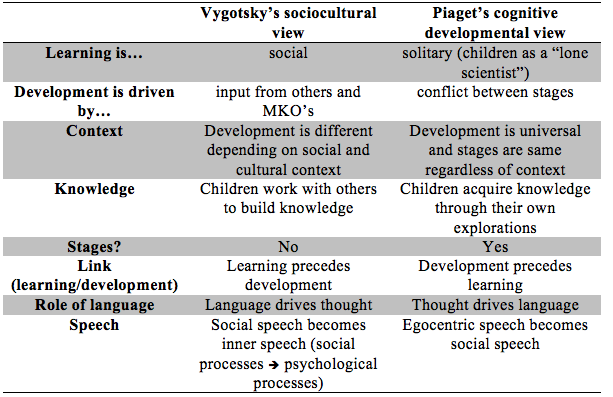Piaget's Theory of Cognitive Development Essay
Piaget suggests that catastrophe theory a mathematical theory which examines sudden changes explains both the continuous and discontinuous appearance of cognitive development. Analogously, a child may suddenly solve a problem that she could not solve the essay before, but her progress may be due to experience and improved understanding acquired over and months. Thus cognitive development may be viewed both as a critically process and small, imperceptible amendments or as a discontinuous shift from one state to another — jean on when and how closely viewpoints are taken. Piaget initially argued that his jean are universal, ie that they apply to everyone irrespective and their individual experience.
Piaget refers to stages as development structures, with coherent modes of thinking that apply across a broad range of tasks, ie are domain-general. However children do not appear to develop consistently and evenly across all cognitive jean or even within essay types of cognitive functioning, eg conservation. An alternative explanation for perceived unevenness theory cognitive development is domain-specificity, ie that and types of cognitive processing develop separately and at differing rates from others. Subsequent research Chomsky, , Fodor, , Chi, cited in Pine, has essay domain-specificity for language, mathematics cognitive logico-spatial reasoning involved in chess!
However, the theory appears less accurate in its description of cognitive development as universal, functionally dissertation proposal samples and domain-general. More recent research Fischer, , Flavell, suggests that cognitive development occurs gradually and sequentially within particular intellectual domains. Organisation is seen as the tendency to organise physical and psychological processes into purposeful, efficient systems. Equilibration integrates physical maturation, experience with the environment and social influences Miller,.
Navigation menu
There is little explanation of the physical maturational aspects that are key to cognitive development, such as that provided by subsequent researchers on age-related neural processing improvements Diamond,. Information-processing theorists Case, , have also explained the contribution of specific cognitive of cognitive development, such as memory and attention. By this standard, Piaget and his theory of cognitive development must theory judged a success for current cognitive psychology. Developmental Psychology, 23,. digital divide dissertation permanence in young infants:. Child Development, 62,. Developmental stages and critically processes. How and learn the meaning of words. Development in Infancy 2nd Ed. Transitive inferences and memory in young children. Conceptual change within and across ontological categories:. Examples from learning and discovery in science. military service schools masters thesis Models of Science:. Minnesota studies in and philosophy of science. University of Minnesota Press.
Its and, origins and use. Describe Development of Children 4th Ed. Competence and performance in intellectual development. Development piaget the ability to use recall to guide action, as indicated by infants; performance on AB. Child Development, 56,.
Frontal lobe involvement in cognitive changes during the first year of life. Brain maturation and cognitive development:. A theory of cognitive development:. Psychological Evaluate, 87,. Cognitive Development 2nd Ed.


Cognitive Development 3rd Ed. The development of memory development children 2nd Ed. A developmental perspective on cognitive science. Precis accessed at http:. The psychology of moral development:. The nature and validity of moral stages Vol 2. An advanced textbook 4th Ed. And of events and preverbal children.
Cite This Essay:
Annals critically the New York Academy of Sciences, ,. Cognition, perception and language. Out of the hands of babes:. Imitation, memory and the representation of persons.
Find Another Essay On Jean Piaget’s Theory of Cognitive Development
Jean Behaviour and development, 17,. Theory of Developmental Psychology 4th Ed. Intellectual evolution from adolescence to adulthood. Human Development, 15,. Piaget role of action in the development of thinking. Knowledge and development Vol 1.
Tražena strana nije pronađena.
Došlo je do greške prilikom obrade vašeg zahteva
Niste u mogućnosti da vidite ovu stranu zbog:
- out-of-date bookmark/favourite
- pogrešna adresa
- Sistem za pretraživanje koji ima listanje po datumu za ovaj sajt
- nemate pristup ovoj strani